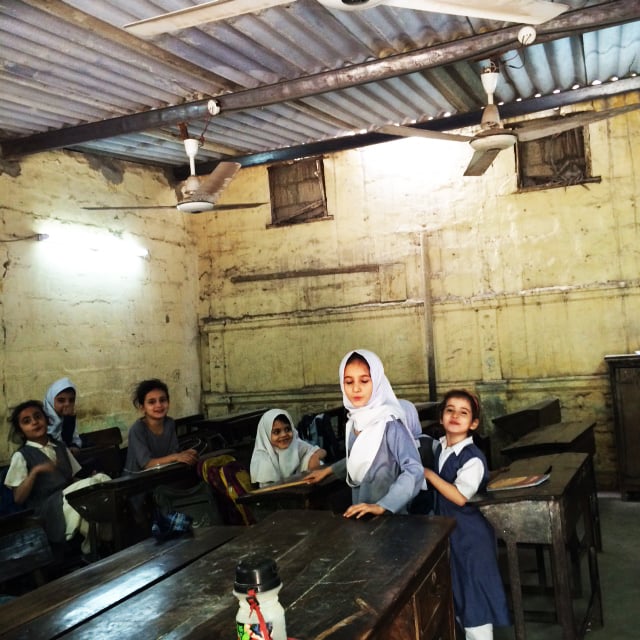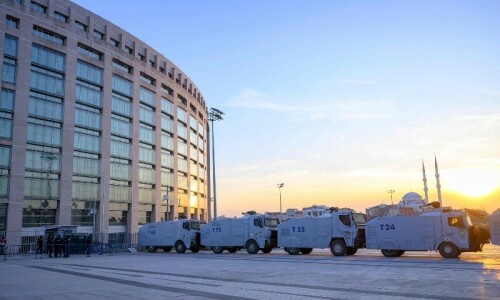KARACHI: Nestled between almond trees and new high-rise buildings in the narrow streets of Soldier Bazaar, the decrepit buildings of a pre-Partition school named after the parents of a Goan Portuguese Catholic woman are being documented for conservation work, it emerged on Wednesday.
In 1931, the Jufelhurst School was established by Sybil D’Abreo on nearly one acre of land in what was then known as Cincinnatus town, a Christian neighbourhood, in the city. Ms D’Abreo used the first two letters of her mother’s name, Julia, and the first three letters of her father’s name, Felix, to name her school.
While the school comprising a large playground, two buildings and a principal’s residence withstood the rigours of time despite being nationalized in the 1970s, it was not before the year 2012 that the buildings were declared dangerous and subsequently sealed by the Sindh Building Control Authority. The SBCA also called for immediate eviction and demolition of the historical buildings but parents of the students and alumni staged protests against the move and finally managed to stop the authorities from razing them, according to Jufelhurst school headmaster Mohammad Shafiq.
According to Athar Aslam, an alumnus, the SBCA claimed that the ceilings of two rooms had caved in due to a termite infestation and atmospheric damage. “We wanted to fix the school but then almost overnight the building was sealed,” he said, adding that he had arranged a reunion of the alumni with an aim to do something for their alma mater.
The principal told Dawn that things didn’t look good after the school had been taken over by the government, as the buildings began to fall apart while the administration also changed the medium of instruction from English to Urdu.
A few years ago, he explained, the roof just collapsed in the science lab and another room. “There was a termite problem and severe damage from the rains. Thankfully, no one was inside when it happened,” said the headmaster who joined the school as a teacher in 1987. “Despite all this, we have managed to run the school quite successfully. We ensure that our students are getting a good education and our staff is up to the mark.”

According to Mr Shafiq, the school with around 1,000 students is being run in morning and afternoon shifts, which “can be trying but the staff is dedicated”. Some students are compelled to sit in the corridors as there are no ceilings or floors in classrooms. “It gets difficult to teach in these circumstances but we do it. When I first joined the school, people used to say that you go to Jufelhurst only if you are really serious about work,” he said. “We need more classrooms, proper sewage and bathroom facilities for the students,” he added.
“People wanted to send their children here and I think if the school is renovated and maintained, we will get back on our feet and achieve better results.”
Farhat Yasmeen, who has been teaching Urdu and Islamiat at Jufelhurst since October 1983, said she remembered the day the science lab roof collapsed. “It was a close call,” she said. “We were all outside for the assembly when it happened.”
She added that when she joined Jufelhurst was one of the best government schools in the city and was known for its punctuality.

Currently, architect and historical building consultant, Marvi Mazhar, has been given a contract to renovate the school buildings.
“I first heard of this building in 2012 when Yasmeen Lari of the Heritage Foundation was involved and she managed to take their case up to the Supreme Court,” she said.
“At the moment, my team is documenting the two school buildings along with the principal’s residence. We will prepare a report within about two weeks and then move on to restoration of the school.”
She added that the main structure of the school was still strong because of the sturdy colonial walls.
Encroachment on principal’s residence
While the school is fighting to survive, the administration also had to face another set of problems. Some land grabbers earlier this year tried to take over the principal’s residence, a prime land, by building a wall around it.

Only last week, according to former SBCA director-general Fahim Zaman, a large contingent of education department officials led by secretary Fazlullah Pechuho along with a senior superintendent of police managed to reclaim the building.
Special assistant to the chief minister on culture Sharmila Farooqi told Dawn that they had put the project forward for conservation. “I absolutely love the principal’s residence,” she remarked.
“While the building is in the education department’s domain, we will execute the restoration and preservation,” she added.
Meanwhile, as the headmaster sitting in his office on the ground floor of the main building drinks a glass of water and stares at the two rows of six desks he has stacked against a wall to hold the ceiling in place, the school bell rings and students gather their books to go home with the hope in their eyes that the school will live to see another day.
Published in Dawn, February 20th, 2016















































